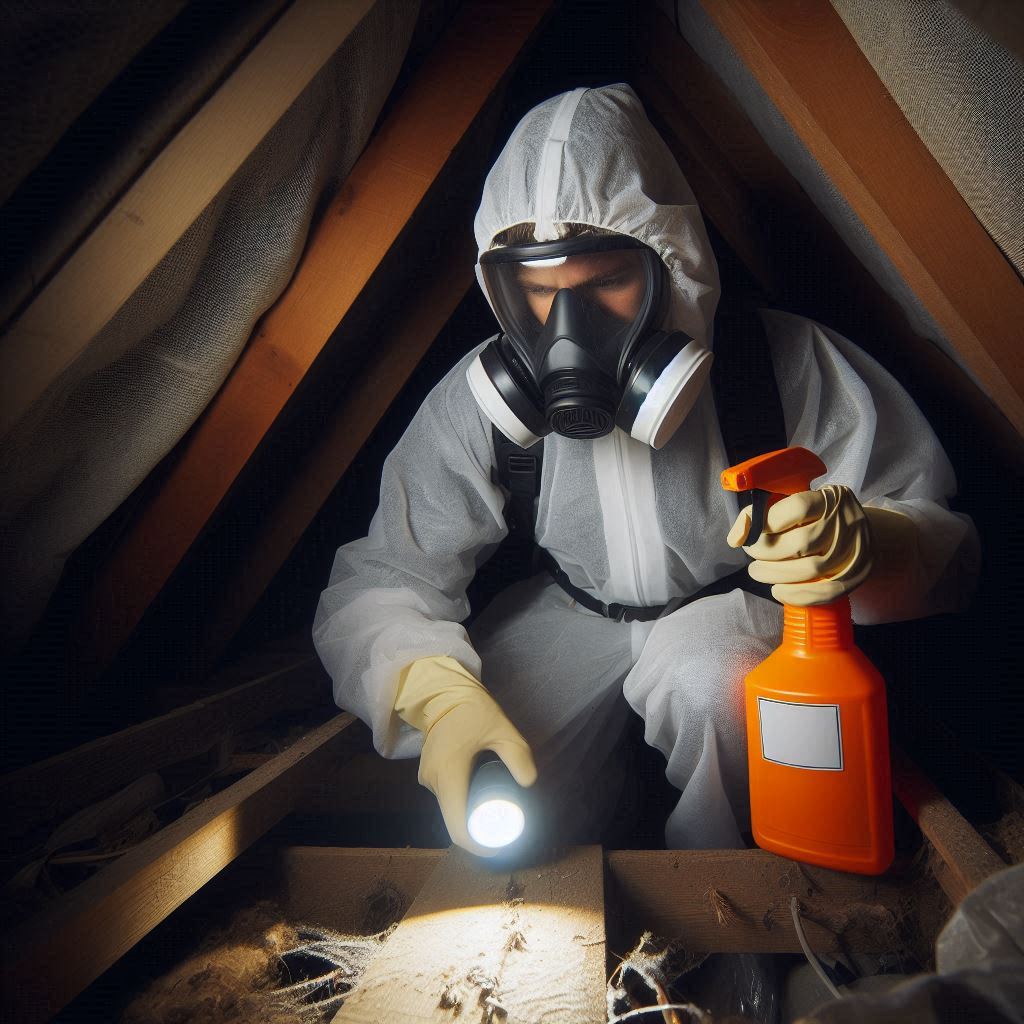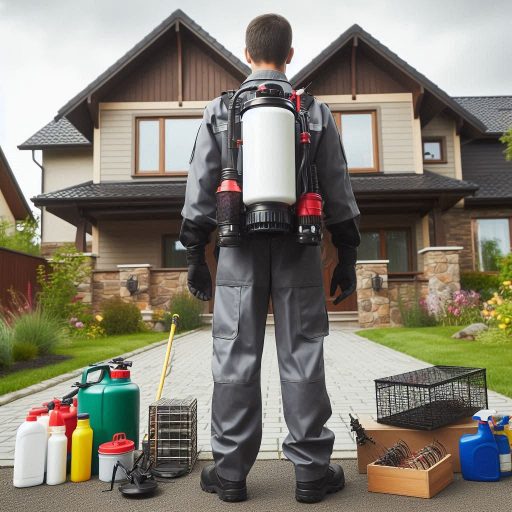Introduction
Let‘s explore how pest control worker receive training and education to develop essential skills for their profession.
Pest control workers play a crucial role in safeguarding homes, businesses, and public spaces from harmful pests.
Their services are essential in preventing health risks, structural damage, and contamination.
With growing urbanization and climate change, the demand for pest control services continues to rise rapidly.
Why Pest Control Services Are in Demand
- Health Protection: Controlling pests reduces the spread of diseases like malaria and Lyme disease.
- Structural Safety: Prevents damage from termites and rodents in buildings.
- Environmental Impact: Safely handles pests while minimizing harm to ecosystems.
Importance of Proper Training and Education
To meet industry demands, pest control workers must receive adequate training and education.
Trained workers understand pest biology, chemical safety, and proper extermination techniques.
Additionally, regulatory bodies often require certifications to ensure service quality and environmental safety.
Proper education helps workers:
- Identify various pests accurately
- Select appropriate treatments for different infestations
- Follow safety protocols for chemical handling
The need for well-trained professionals in pest control will only grow as pest-related challenges increase.
Investing in the right training ensures competent workers and effective pest management solutions.
Job Responsibilities
Pest control workers play a crucial role in protecting homes and businesses from infestations.
They perform various tasks that require both technical knowledge and interpersonal skills.
Here are the main responsibilities of a pest control worker.
Common Pests and Their Behaviors
First, pest control workers must identify common pests.
These include ants, roaches, termites, and rodents.
Each pest has specific behaviors and habitats.
Understanding these traits helps workers determine the best control methods.
For example, knowing that termites swarm during certain seasons informs treatment plans.
Workers often study pest biology and ecology to enhance their identification skills.
This knowledge allows them to anticipate pest movements and breeding cycles.
Accurate identification is key to effective pest management.
Inspect Properties for Signs of Infestation
Next, pest control workers conduct thorough property inspections.
They look for signs of pest activity, such as droppings, nests, or damage.
These inspections require keen observation and analytical skills.
Workers often inspect both the interior and exterior of buildings.
They check basements, attics, and crawl spaces for hidden infestations.
The goal is to uncover all potential problem areas.
Workers also assess environmental factors that may attract pests.
These factors include moisture levels and food sources.
A comprehensive inspection is essential for developing an effective treatment plan.
Develop Treatment Plans and Apply Pesticides
After identifying pests and their habitats, workers develop treatment plans.
These plans must be tailored to each situation.
Workers select appropriate pesticides based on the type of pest and the severity of the infestation.
They consider both effectiveness and safety when choosing products.
Applying pesticides requires precise techniques to minimize risks.
Workers follow guidelines to ensure they use the right amount and method.
Proper application techniques enhance treatment effectiveness and protect non-target species.
Pest control workers must document their actions and results for accountability.
Educate Clients on Preventive Measures
In addition to treatment, pest control workers educate clients.
They explain preventive measures to minimize future infestations.
Workers provide tips on proper sanitation and sealing entry points.
They also advise on landscaping choices that deter pests.
Educating clients fosters a collaborative approach to pest management.
This partnership empowers clients to take proactive steps.
When clients understand the risks, they become more engaged in prevention.
Knowledgeable clients contribute to long-term pest control success.
Follow Safety Protocols and Regulations
Pest control workers must follow safety protocols.
They wear protective gear during inspections and applications.
This gear includes gloves, masks, and goggles to minimize exposure to chemicals.
Workers also adhere to local regulations regarding pesticide use.
Compliance ensures both personal safety and environmental protection.
They stay informed about changing regulations and industry best practices.
Continuous education helps workers maintain safe and effective methods.
By prioritizing safety, pest control workers protect themselves and their clients.
Pest control workers play an essential role in maintaining healthy environments.
Their responsibilities require a combination of skills and knowledge.
Through diligent efforts, they help prevent and manage pest infestations effectively.
Read: How to Balance Work and Personal Life in Childcare
Required Education and Training
To become a pest control worker, you must meet certain education and training requirements.
These qualifications help you gain the skills needed for the job.
Below are the key elements of the required education and training.
High School Diploma or Equivalent
Most pest control companies require applicants to have a high school diploma or equivalent.
This credential forms the foundation for further training.
You learn essential skills such as reading comprehension and basic math.
These skills help you understand pesticide labels and perform calculations.
Furthermore, obtaining a diploma enhances your employability.
Some employers may accept relevant work experience in place of a diploma.
However, having this qualification remains the standard.
On-the-Job Training Provided by Employers
Once you secure a position, employers typically provide on-the-job training.
This training prepares you for the specific tasks involved in pest control.
You learn how to use equipment, apply pesticides, and follow safety protocols.
Experienced technicians often mentor new hires during this phase.
They share valuable insights and practical tips.
This hands-on experience is crucial in building confidence and competence.
You gain exposure to different pest control methods and products.
Over time, you develop a deeper understanding of pest behavior and control strategies.
Transform Your Career Today
Unlock a personalized career strategy that drives real results. Get tailored advice and a roadmap designed just for you.
Start NowCompletion of Certification Programs or Licenses
Many states require pest control workers to obtain specific certifications or licenses.
Completing a certification program demonstrates your knowledge of pest control practices.
These programs often cover topics such as pest identification, treatment methods, and safety measures.
Additionally, you learn about environmental regulations related to pesticide use.
Most certification courses include a combination of classroom instruction and practical training.
After completing the course, you typically take an exam to obtain your certification.
This credential sets you apart from unlicensed individuals and enhances your credibility in the field.
Continuing Education to Stay Updated on New Techniques and Regulations
The pest control industry continuously evolves due to advances in technology and changes in regulations.
Continuing education is essential for professionals in this field.
Many states require licensed pest control workers to complete ongoing training.
This training helps you stay informed about new pest control products and methods.
You also learn about updated safety regulations and environmental guidelines.
Attending workshops, seminars, or online courses can fulfill these requirements.
Engaging in continuing education allows you to provide better service to your clients.
Staying informed helps you address pest issues effectively and safely.
Becoming a pest control worker involves specific education and training.
A high school diploma or equivalent is essential.
Employers provide valuable on-the-job training to enhance your skills.
Completing certification programs and obtaining licenses is often necessary.
Additionally, participating in continuing education ensures you remain knowledgeable about industry advancements.
By fulfilling these requirements, you position yourself for a successful career in pest control.
Read: Best Pet Grooming Schools in the United States
Skills and Qualities Needed
Working as a pest control worker requires a specific set of skills and qualities.
These traits not only enhance job performance but also ensure safety and efficiency in pest management.
Below are the essential skills and qualities needed for this role.
Attention to Detail
Pest control workers must possess strong attention to detail.
They often encounter small pests that can hide in various locations.
Missing a detail can lead to ineffective pest control.
For example, they need to identify potential pest entry points accurately.
This skill also helps them apply treatments effectively.
By being detail-oriented, workers can monitor pest behavior and assess treatment success.
Their meticulous nature contributes significantly to client satisfaction and long-term pest solutions.
Physical Stamina for Long Hours of Work
Pest control workers frequently face physically demanding tasks.
They often spend long hours on their feet, moving between different job sites.
Their work may involve carrying heavy equipment and supplies.
Physical stamina is crucial for maintaining energy and focus throughout the day.
Workers might need to crawl into tight spaces or climb ladders to access certain areas.
By maintaining their physical fitness, they can perform their tasks effectively and safely.
Their stamina ensures they complete jobs without compromising service quality.
Problem-Solving Skills
Problem-solving skills are vital for pest control workers.
Each pest issue presents unique challenges that require creative solutions.
Workers must assess the situation, identify the pests, and determine the best course of action.
They often develop tailored treatment plans for each client‘s needs.
Effective problem-solving enhances their ability to handle unexpected issues during treatment.
By applying critical thinking, they can adapt strategies and overcome obstacles.
This skill not only boosts their confidence but also builds trust with clients.
Communication Skills for Interacting with Clients
Strong communication skills are essential for pest control workers.
They need to explain treatment options clearly to clients.
Good communication fosters trust and ensures clients understand the process.
Workers must listen actively to clients‘ concerns and questions.
This engagement helps them assess the situation accurately.
They also need to provide follow-up instructions to ensure long-term success.
Effective communication builds strong relationships with clients, leading to repeat business and referrals.
Knowledge of Safe Pesticide Handling Procedures
Understanding safe pesticide handling procedures is critical for pest control workers.
They must be familiar with local regulations regarding pesticide use.
Proper training ensures they apply products safely and effectively.
Knowledge of safety protocols protects both workers and clients from harm.
They need to wear appropriate personal protective equipment (PPE) during treatments.
Additionally, workers must know how to store and dispose of pesticides correctly.
This knowledge promotes a safe working environment and reinforces their professionalism.
Pest control workers must possess a unique blend of skills and qualities.
Attention to detail, physical stamina, problem-solving skills, and strong communication contribute to their effectiveness.
Additionally, knowledge of safe pesticide handling procedures ensures the safety of everyone involved.
By honing these skills, pest control workers can excel in their roles and deliver exceptional service to their clients.
Read: Steps to Become a Professional Pet Groomer in the USA

Types of Training Programs Available
Pest control workers need various types of training to perform their jobs effectively.
Different training programs exist to help individuals gain the necessary skills.
These programs include online courses, vocational schools, apprenticeships, and certification programs.
Each type offers unique advantages and learning opportunities.
Online Courses in Pest Management
Online courses in pest management provide flexibility and convenience.
These courses allow learners to study at their own pace.
Many institutions offer comprehensive online programs.
These programs cover essential topics like pest identification, safety protocols, and control methods.
Students can access resources and video tutorials from anywhere.
This format suits busy individuals balancing work and personal commitments.
Additionally, online courses often cost less than traditional classes.
They also enable students to stay updated on the latest industry practices.
Vocational Schools Offering Pest Control Programs
Vocational schools play a vital role in training future pest control workers.
These institutions offer hands-on training and practical experience.
Students learn about pest biology, environmental impacts, and chemical safety.
They also gain essential skills through classroom instruction and fieldwork.
Many vocational programs lead to certificates or diplomas.
Graduates often find employment opportunities immediately after completing their studies.
Employers value graduates who possess formal education and practical skills.
Attending a vocational school also fosters networking opportunities.
Students can connect with industry professionals and find job placements.
Apprenticeships with Experienced Pest Control Workers
Apprenticeships provide an excellent pathway for aspiring pest control workers.
These programs allow students to work alongside experienced professionals.
Apprentices receive on-the-job training while earning a wage.
They learn how to handle equipment, apply treatments, and interact with customers.
This hands-on experience enhances their skill set significantly.
Apprenticeships usually last one to two years, depending on the program.
Participants gain valuable insights into the industry and develop essential problem-solving skills.
Additionally, many employers prefer hiring individuals with apprenticeship experience.
This training method ensures that workers understand real-world challenges in pest control.
Certification Programs from Professional Organizations
Certification programs from professional organizations enhance a pest control worker’s credentials.
These programs require participants to demonstrate their knowledge and skills through examinations.
Achieving certification often leads to better job prospects and higher wages.
Organizations such as the National Pest Management Association (NPMA) offer reputable certification programs.
These programs cover various aspects of pest control, including ethics, safety, and regulations.
Completing a certification program shows employers that candidates are dedicated and knowledgeable.
Many states also require pest control workers to hold specific licenses or certifications.
Pursuing certification remains essential for career advancement.
Aspiring pest control workers have multiple training options available.
Online courses offer convenience, while vocational schools provide hands-on experience.
Apprenticeships allow students to learn from professionals, and certification programs enhance credentials.
Each program plays a crucial role in developing competent pest control workers ready to face industry challenges.
Read: Finding the Right Work-Life Balance as a Nail Tech
Advantages of Getting Formal Training
Pest control workers play a crucial role in maintaining health and safety in our communities.
Formal training offers numerous benefits that can significantly enhance a worker’s career.
Let’s explore the advantages of obtaining formal training in pest control.
Showcase Your Business Today
Reach thousands of readers actively exploring professional services. Publish your business profile and grow your audience now.
Publish NowBetter Job Prospects and Higher Pay
Completing formal training opens the door to better job opportunities.
Many employers prefer candidates with certifications and specialized training.
This preference often translates into a higher salary.
Skilled workers with training have a competitive edge over those without it.
Companies recognize that trained workers can deliver better results.
This recognition leads to increased job security and career advancement opportunities.
Formal training enhances earning potential.
Workers with certifications often enjoy faster promotions and higher-paying positions.
Increased Credibility with Clients and Employers
Having formal training establishes credibility in the pest control industry.
Clients feel more confident when hiring trained professionals.
They trust that these workers possess the necessary skills and knowledge.
This trust leads to better client relationships and repeat business.
Employers also value the credibility that comes with formal training.
They appreciate employees who can represent the company well.
A trained worker boosts the company’s reputation and reliability.
Increased credibility can result in more significant job responsibilities and leadership roles.
Formal training instills confidence in both clients and employers.
Enhanced Knowledge of Pest Control Methods
Formal training provides workers with a deeper understanding of pest control methods.
Participants learn about the latest techniques and technologies in the field.
This knowledge allows them to address various pest issues effectively.
Understanding pest biology and behavior enables workers to develop targeted strategies.
This targeted approach often leads to more successful pest management.
Training also covers safety protocols and regulations.
Workers become well-versed in handling chemicals safely and responsibly.
Enhanced knowledge not only improves job performance but also increases client satisfaction.
Access to Networking Opportunities in the Industry
Formal training programs often include networking opportunities.
These programs connect workers with industry professionals and experts.
Building a professional network can be incredibly beneficial.
Networking leads to potential job openings and collaborations.
Participants often meet individuals who can mentor or guide them in their careers.
Additionally, industry events provide access to the latest trends and innovations.
Workers who engage in networking can gain valuable insights into the field.
Such connections can lead to referrals and recommendations for future job opportunities.
Investing in formal training as a pest control worker offers many advantages.
Better job prospects and higher pay can significantly enhance a worker’s career.
Increased credibility with clients and employers fosters trust and professional growth.
Enhanced knowledge of pest control methods improves job performance and client satisfaction.
Access to networking opportunities opens doors to future career advancements.
Formal training is a wise investment for anyone looking to thrive in the pest control industry.
Career Advancement Opportunities
Pest control workers can explore numerous career advancement opportunities.
With dedication and skill, they can move into supervisory roles, specialize in pest types, start their own businesses, or teach others in the field.
Supervisory Roles in Pest Management Companies
Supervisory roles often serve as the next step for experienced pest control workers.
These positions allow workers to oversee teams and manage operations.
In these roles, individuals coordinate pest control strategies and ensure quality service.
Supervisors handle employee training and enforce safety standards.
They also manage customer relations and resolve conflicts.
Aspiring supervisors should focus on developing leadership skills and understanding business management.
Employers typically look for candidates with experience and strong communication skills.
Successful supervisors can significantly influence the company’s reputation and profitability.
Specialization in Specific Types of Pests
Another avenue for career advancement involves specialization in specific pest types.
Workers can choose to focus on termites, rodents, or other pests.
Specializing allows them to develop in-depth knowledge and expertise.
Pest control professionals can increase their marketability by earning certifications in these areas.
Specialized knowledge helps workers deliver tailored solutions to clients.
They can identify pest behavior patterns and apply the most effective control methods.
Furthermore, specialists often command higher salaries due to their expertise.
This focus can also lead to opportunities in research or development within the industry.
Starting a Pest Control Business
Some pest control workers choose to start their own businesses.
Entrepreneurship allows individuals to create their brand and work independently.
To succeed, they must understand the legal and financial aspects of running a business.
Entrepreneurs need a strong business plan and marketing strategy to attract clients.
Networking with suppliers and other professionals is essential for business growth.
Starting a business offers freedom but also presents risks.
Workers must stay informed about industry trends and customer needs.
A successful pest control business can provide significant financial rewards and job satisfaction.
Teaching or Consulting in the Field
Experienced pest control workers can also transition into teaching or consulting roles.
Teaching positions often exist at technical schools or community colleges.
Instructors share their knowledge and skills with aspiring pest control professionals.
They create course materials and develop hands-on training programs.
Consulting allows experts to advise businesses on pest management strategies.
Consultants assess clients‘ needs and recommend effective solutions.
Both teaching and consulting roles often require advanced knowledge and experience.
Professionals in these fields can shape the future of pest control by educating the next generation.
Pest control workers enjoy a range of career advancement opportunities.
By pursuing supervisory roles, specialization, entrepreneurship, or teaching, they can enhance their careers.
With commitment and the right training, these professionals can achieve their career goals.
See Related Content: Flight Attendant Salary: What to Expect
Conclusion
Becoming a pest control worker requires specific training and education.
Aspiring professionals should pursue formal programs that cover pest management principles.
Hands-on experience through internships or apprenticeships significantly enhances skill development.
Certification and licensure often depend on completing educational requirements.
Obtaining credentials can open doors to better job opportunities.
Consider pursuing courses that focus on integrated pest management and safety practices.
This knowledge will prepare you to handle various pest challenges effectively.
Stay updated on industry trends and regulations to excel in your career.
Ongoing education helps you adapt to new methods and technologies.
Attend workshops, conferences, and webinars to expand your knowledge base.
Networking with industry professionals also provides valuable insights.
By investing in your training and education, you build a solid foundation for success in pest control.
This field offers diverse career paths, from residential services to commercial pest management.
Embrace the journey and commit to lifelong learning in pest control.
Your dedication will lead to a rewarding and impactful career.
[E-Books for Sale]
The Big Book of 500 High-Paying Jobs in America: Unlock Your Earning Potential
$19.99 • 500 High-Paying Jobs • 330 pages
Explore 500 high-paying jobs in America and learn how to boost your career, earn more, and achieve success!
See All 500 High-Paying Jobs of this E-Book
1001 Professions Without a Degree: High-Paying American Jobs You Can Start Now
$19.99 • 1001 Professions Without a Degree • 174 pages
Discover 1001 high-paying jobs without a degree! Unlock career tips, skills, and success strategies for just $19.99!




